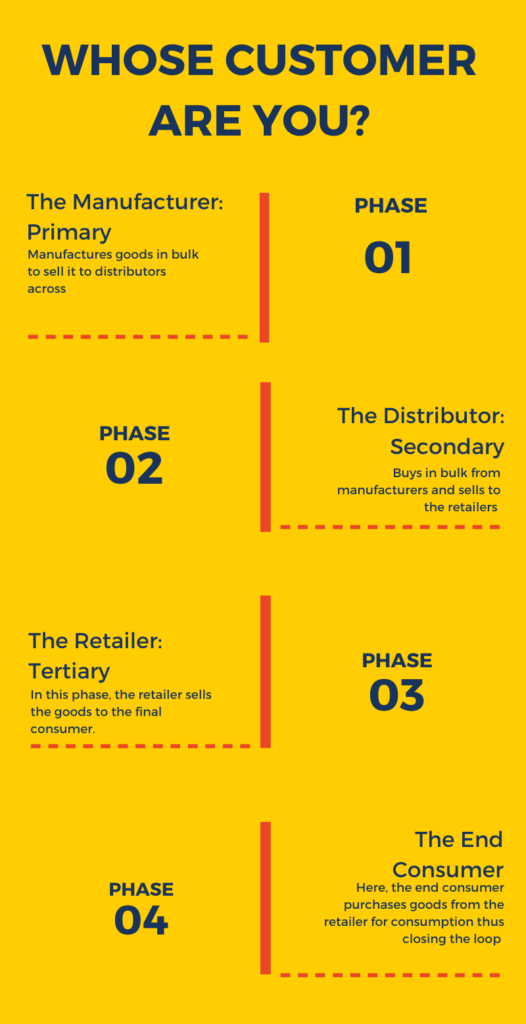In the supply chain, before a product reaches to end customers, it will first reach at least three stakeholders: a manufacturing company or a national supplier, distributor, and retailer. The sales transactions from each level of stakeholders have different names: primary, secondary, and tertiary sales.
A] Primary Sales:
Primary sales refer to sales from the first stakeholder—a manufacturing company or national supplier to a distributor. In other words, the transaction between a manufacturing company/national supplier to a distributor in one city/state/region called “primary sales” transaction. A company makes an invoice of the product at distributor price and the revenue from the transaction is the net revenue of the company.
Factors Determining Primary Sales:
Primary sales in a company are determined by various factors, including:
- The company’s popularity
- The company’s distribution network, how large it is
- The secondary sales
- The consumption pattern of a certain product, whether it is slow or fast.
Those factors determine a Mystery Shopping company’s primary sales. The primary sales contribute to the company’s profits and revenue, thus, it is the main focus of the company. However, primary sales must be done with secondary sales to make it effective.
B] Secondary Sales:
After a product reaches a distributor, it will be invoiced to a retailer, thus, the transaction is called secondary sales. Distributors will keep its margin and set the product at dealer/retailer price.
In the secondary sales, a distributor sells the product to a retailer. Nevertheless, a distributor can also sell it directly to an end customer. In modern retail, it works on the two-tier concept where the primary sales are from the company to the retail outlet and the secondary sales are from retail outlets to customers.
Factors Determining Secondary Sales:
Secondary sales are determined by several key factors, including:
- The company’s popularity and brand equity of the company
- Stock availability
- The involvement of distributors and retailers
- Credit and trade promotions, the better trade promotions, the higher the sales are.
Secondary sales are more important than the primary sales to a manufacturer industry because it affects the primary sales though it is not the responsibility of the manufacturer but the distributors/retailers. At this point, if the distributors do not show well performance, the companies have to find new distributors will better performance. This will ensure the fast movement of the company. In the final level of sales are tertiary levels. Tertiary sales are typically observed only if it’s on the three-tier distribution. For example, if the company sells a distributor who sells the product directly to the customers, then the tertiary sales will not exist.
C] Tertiary Sales:
Tertiary sales are when a retailer sells the product to an end customer. On this transaction, the product is sold at MRP (maximum retail product) or MOP (market operating price).
Tertiary sales involve end costumers which are the most important sales of all. Thus, companies should focus more on these sales to maximize their tertiary sales. If the tertiary sales are high, the secondary and the primary sales will automatically happen and these all will be done by mystery shopping.
Factors Determining Tertiary Sales:
Several key factors that determine tertiary sales are:
- Customers’ convenience to buy the product
- The marketing strategies to attract customers to make a purchase
- The company’s brand equity, the more popular the company, the more the tertiary sales will be appreciated by Market Segmentation.
- Product alternatives—a cheaper or a higher quality alternative of products
- Overall market movement.

To sum up..
The primary, secondary, and tertiary sales are fairly important in generating revenue, thus, if the company wants to gain a huge amount of revenue, they should focus on the three levels of sales because they can boost sales for the company. Companies also follow mystery shopping strategies to audit these sales.
FloorWalk, is one of the leading mystery shopping companies in India, with over 25k plus freelance auditors. Stock audits are one of the services which FloorWalk provides PAN India. We help clients gauge everything from consumer experience to process compliance on the ground level. To know more about what we do and how we do it, click on the button below.












